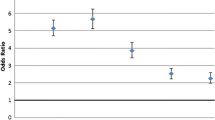Abstract
Letter series and number series tests, consisting of items based on identical rules, were administered in a counterbalanced design to 320 (160 female and 160 male) undergraduates in order to investigate the gender differences in inductive reasoning ability measured by letter and number series tests. Results indicated that female college students obtained significantly higher (p<.05) means on letter series tests, but showed no such superiority on number series.
Similar content being viewed by others
References
Butterfield, E. C., Nielsen, D., Tangen, K. L. & Richardson, M. B. (1985). Theoretically based psychometric measures of inductive reasoning. In S. E. Embretson (Ed.),Test design: Developments in psychology and psychometrics (pp. 77–147). New York: Academic Press.
Erstad, D. (1988). The comparability of WAIS and WAIS-R for ages 60–90. Unpublished master’s thesis, Marquette University, Milwaukee, WI.
Halpern, D. F. (1992).Sex differences in cognitive abilities. (2nd ed.). Hillsdale, NJ: Lawrence Erlbaum.
Hyde, J. S., Fennema, E., Lamon, S. J. (1990). Gender differences in mathematics performance: A meta-analysis.Psychological Bulletin, 107, 139–155.
Maccoby, E. E. (1990). Gender and relationships.American Psychologist, 45, 513–520.
Maccoby, E. E. & Jacklin, C. N. (1974).The psychology of sex differences. Stanford, CA: Stanford University Press.
Quereshi, M. Y. (1960). Mental test performance as a function of payoff conditions, item difficulty, and degree of speeding.Journal of Applied Psychology, 44, 65–77.
Quereshi, M. Y. & Fisher, T. L. (1977). Logical versus empirical estimates of item difficulty.Educational and Psychological Measurement, 37, 91–100.
Quereshi, M. Y. & Ostrowski, M. J. (1985). The comparability of three Wechsler Adult Intelligence Scales in a college sample.Journal of Clinical Psychology, 41, 397–407.
Simon, H. A. & Kotovsky, K. (1963). Human acquisition of concepts for sequential patterns.Psychological Review, 70, 534–546.
Thurstone, L. L. (1938).Primary Mental Abilities. Chicago: University of Chicago Press.
Author information
Authors and Affiliations
Rights and permissions
About this article
Cite this article
Quereshi, M.Y., Seitz, R. Gender differences in reasoning ability measured by letter series items. Current Psychology 12, 268–272 (1993). https://doi.org/10.1007/BF02686808
Accepted:
Issue Date:
DOI: https://doi.org/10.1007/BF02686808



